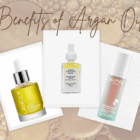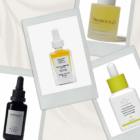Table of Contents:
The Impact of Hormones on Skin Throughout Menopause
Common Skin Challenges During Menopause
Managing the Itchy Skin That Often Comes with Menopause
Acne Treatments for Mature Skin
Fading Pigmentation and Preventing Spots
Addressing Wrinkles, Sagging, and Thinning Skin
Preventing Inflammation
Frequently Asked Questions
Our Top Picks
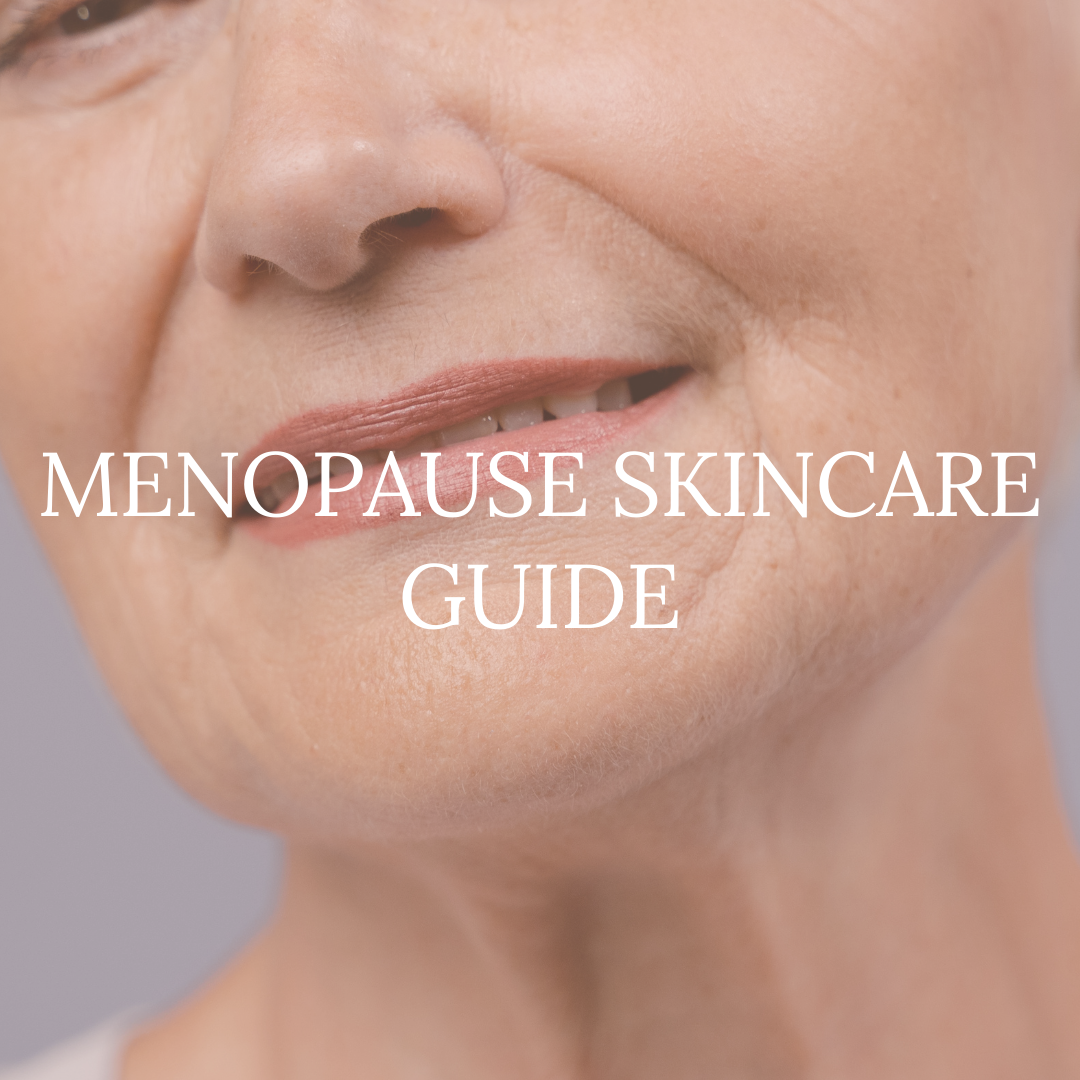
Menopause is quite the journey, and your skin goes through it with you. Hormonal changes can cause all kinds of surprises, like dryness, itchiness, wrinkles, and even breakouts that you didn’t see coming.
Whether you’re just starting menopause or have been postmenopausal for a while, this guide is here to help you understand what’s going on with your skin.
It’s not about chasing youth or trying to erase every wrinkle; aging is natural, and there’s nothing wrong with embracing those lines as part of your story. The goal is to provide your skin with gentle care, allowing it to stay healthy and comfortable as you move forward.
The Impact of Hormones on Skin Throughout Menopause
Estrogen Loss and How It Ages Your Skin
When menopause hits, estrogen levels dive, and your skin feels the impact. Estrogen helps keep your skin plump and hydrated by supporting collagen and elastin, the stuff that gives your skin strength and bounce. As estrogen drops, you might start noticing:
- Your skin feels thinner and more fragile
- It gets drier and loses some of its glow
- Wrinkles and sagging become more obvious
- Cuts and bruises take longer to heal
Research shows that after menopause, skin can thin out by about 1% every year without enough estrogen. You’ll probably see these changes most around your eyes, such as puffiness, fine lines, and dark circles. These are all normal signs of how estrogen loss affects your skin over time.
Androgens, Acne, and Facial Hair
Even though testosterone doesn’t actually increase during menopause, the drop in estrogen lets androgens take the lead. This change can cause:
- More oil (sebum) production
- Adult acne or oily skin during menopause
- Unwanted facial hair growth
This can come as a surprise, especially if you’ve never dealt with oily skin or breakouts before. Hormonal acne after 50 is a thing, and it often needs a different kind of care than the acne you may have had as a teenager.
Skin Changes Before Menopause Begins
Your skin can start to change even before menopause officially arrives during the perimenopause phase. Instead of a steady decline, you might notice ups and downs as your hormones fluctuate. Some early signs include:
- Dry patches or occasional breakouts
- Increased sensitivity or skin that reacts easily
- Periodic flare-ups of conditions like eczema or rosacea
Catching these early clues can really help you prepare. More people are focusing on skincare during this pre-menopause stage, and having the right routine now may ease or even prevent some of the tougher skin changes that lie ahead.
Common Skin Challenges During Menopause
From perimenopause onward, as estrogen levels drop, your skin can go through quite a few changes. Hormones play a big part in these shifts. Here are some common skin issues you might notice during this time:
- Dryness: When estrogen drops, your skin struggles to lock in moisture like it used to, leaving it feeling dry and tight.
- Itchiness: Many women notice general itching, which can be really frustrating, and if you scratch too much, it might even cause skin damage.
- Wrinkles: Lower estrogen means less collagen and elastin, the proteins that keep skin firm and stretchy, so wrinkles start to appear more easily.
- Sensitivity: Hormonal shifts can make your skin more sensitive, causing reactions to products or environments that didn’t bother you before.
- Thinning Skin: With less estrogen, your skin gets thinner and more delicate, which can lead to bruises and tears, and those dark circles under your eyes might stand out more.
- Reduced Elasticity: Your skin may lose some of its bounce-back ability, leading to sagging or a looser look.
- Hyperpigmentation: Hormonal changes can bring on dark spots or patches, often called age spots or liver spots.
- Slower Healing: Your skin might take longer to recover from cuts, bruises, or other damage.
- Acne: Some women get acne during menopause due to hormonal shifts that affect oil production or skin barrier health.
- Rosacea Flare-ups: If you have rosacea, menopause can trigger more frequent flare-ups thanks to hormone changes.
- Increased Facial Hair: Lower estrogen combined with relatively higher androgens can cause unwanted facial hair to grow.
Understanding how hormones impact your skin is a great first step to figuring out a skincare routine that suits the changes menopause brings. If you feel like you want extra help, consulting with professionals at reputable clinics can be a good idea. They can guide you toward treatments made for menopausal skin, helping you care for your skin safely and effectively.
Managing the Itchy Skin That Often Comes with Menopause
Though some women may experience oily skin during menopause, itchiness caused by dryness and a fragile skin barrier is far more typical. Making sure your skin stays well-hydrated can greatly reduce dryness, sensitivity, and itchiness. Hydration truly plays a crucial role in keeping menopausal skin comfortable.
Hydration and Moisture Essentials
Start by drinking more water; it’s a simple but powerful way to help fight dry skin during menopause (and beyond). You might also want to try using a humidifier at home to add moisture to the air, which can keep your skin feeling more hydrated.
Be careful not to damage your skin barrier, since that can cause water to escape and leave your skin even drier. Things like washing too often, over-exfoliating, using harsh cleansers, washing with hot water, or overusing strong skincare ingredients can all weaken your barrier.
Look for skincare products with humectants; these ingredients attract water to your skin. Good options include hyaluronic acid, glycerin, beta-glucan, aloe, and allantoin. Finally, lock in moisture by using moisturizers or emollients rich in lipids (fats). Natural plant oils are some of the best for this.
Soothing Sensitive and Itchy Skin
To calm dry, irritated skin and support your moisture barrier, look for soothing ingredients like ceramides, niacinamide, bisabolol, colloidal oatmeal, and hydrolyzed proteins.
It’s also a good idea to rethink your exfoliation routine. What worked before menopause might now be too harsh. Lactic acid is a gentler option compared to glycolic acid and also helps attract moisture. Another gentle choice is polyhydroxy acids; they’re antioxidants, humectants, and mild exfoliators all in one.
Acne Treatments for Mature Skin
As mentioned earlier, hormonal imbalances during menopause mean testosterone becomes more dominant compared to estrogen. For some, this can lead to oilier skin. But often, acne during this time isn’t just about extra oil or sebum; it can be caused by other hormone-related changes, too.
Acne can often be triggered by dry, dehydrated, itchy, and compromised skin barriers. So, taking care of sensitive and damaged skin, as we discussed earlier, can also help reduce acne. It’s a win-win situation!
Including a high-quality face oil or serum with evening primrose or borage oil in your moisturizing routine might make a difference. These oils are packed with GLA (gamma linolenic acid), which could have a positive effect on hormonal acne.
While natural treatments can be safe and effective for managing acne, it’s important to be cautious. Using too many products or the wrong ones can further damage your skin barrier and worsen the problem. The best approach is to simplify your skincare routine and focus on restoring hydration before trying additional treatments.
Fading Pigmentation and Preventing Spots
When it comes to fading pigmentation and preventing dark spots, there are plenty of effective options from natural remedies to prescription treatments and even professional procedures.
Since different ingredients can vary in how much they might irritate your skin, you can customize your routine based on what your skin tolerates best. Common go-to treatments usually involve Vitamin C or retinoids, but there are many other choices to explore.
Why Sunscreen Matters for Menopausal Skin?
While protecting your skin from cancer is the most important reason to use sunscreen, it also plays a key role in stopping dark spots and hyperpigmentation from getting worse. Menopause brings many changes, including hot flashes, and your skin becomes more sensitive and vulnerable to sun damage during this time. That’s why dermatologists strongly advise applying sunscreen to your face every day, no matter the weather.
Addressing Wrinkles, Sagging, and Thinning Skin
During menopause, wrinkles, sagging, and thinning skin often happen together, and knowing how they’re connected helps in finding the right treatments. These changes all come from similar causes, like reduced collagen, loss of fat beneath the skin, and changes in the skin’s natural framework. Essentially, they’re different signs that your skin is losing the key elements that keep it firm and youthful.
Key Ingredients for Tackling Several Skin Concerns
Skincare marketing can get a bit overwhelming, often promising miracle results that just aren’t realistic. While only a handful of ingredients are backed by solid science, it’s easy to feel like the next big thing is always just around the corner.
Focusing on the simple basics we talked about earlier can make a huge difference, especially for fine lines. After all, nothing highlights wrinkles more than dry, irritated, or flaky skin.
Hydration means plumper skin, and plumper skin means fewer visible wrinkles.
If you’re watching your budget, prioritizing hydration and moisture is the best place to start.
That said, there are also plenty of skincare ingredients aimed specifically at boosting collagen production or improving its quality.
- Retinoids: These ingredients have strong evidence supporting their effectiveness for wrinkles, acne, and hyperpigmentation. However, they often cause dryness and irritation. Many women who once tolerated retinoids well find they become too harsh during menopause. That’s where bakuchiol comes in, a gentler alternative that’s still effective but much kinder to sensitive skin.
- Peptides and Growth Factors: These ingredients are said to send signals to your skin cells to boost collagen production. While there might be some truth to this, there are so many types with limited solid research that it can be confusing. Focus first on hydration, moisture, pigmentation control, and antioxidants. If you have extra budget, then exploring peptides could be worth a try.
- Antioxidants: These fight free radicals that speed up aging, helping improve skin texture and reduce wrinkles. The good news is that ingredients like Vitamin C offer multiple benefits, so you get more bang for your buck.
- Niacinamide: Known for being versatile, niacinamide helps improve skin elasticity, smooth wrinkles, and strengthen the skin barrier. It’s another great multitasking ingredient to include in your routine.
Preventing Inflammation
“Inflammaging” is a term that looks at aging from a whole-body perspective. Simply put, your lifestyle choices have a big impact on how your skin reacts to the hormonal changes during menopause. Paying attention to your habits can help reduce inflammation and keep your skin healthier through this transition.
Drinking plenty of water helps keep your skin elastic and can reduce the look of wrinkles. On the other hand, smoking and heavy drinking harm your skin by speeding up aging and causing free radical damage.
Eating foods rich in antioxidants like berries, spinach, and nuts can protect your skin from these harmful free radicals. Adding foods with phytoestrogens, such as flaxseeds and soy, might also help naturally balance hormones.
Regular exercise is another important factor. It improves blood flow, giving your skin a healthy glow, nourishes skin cells, and sweating can help flush out toxins, which may reduce breakouts and boost overall skin health.
Frequently Asked Questions
What Does Menopause Skin Mean?
Menopause skin refers to the changes that happen to your skin when hormone levels, particularly estrogen, start to decline during menopause. These changes can show up as dryness, thinner skin, increased sensitivity, more visible wrinkles, and even breakouts or oily patches.
Your skin may feel different from what you’re used to, and the products that once worked well might not be as effective anymore. That’s why updating your skincare routine to fit these changes is so important.
Why Is My Skin Itchy During Menopause?
Itchy skin in menopause is often linked to dryness and a weaker skin barrier. As estrogen levels drop, your skin produces less oil and loses its ability to keep moisture locked in. This leads to tight, flaky, and irritated skin. Some women may also experience increased sensitivity, like eczema flare-ups or reactions to histamines. Drinking enough water, using mild moisturizers, and avoiding harsh skincare products can help calm the itch.
Is Oily Skin Normal After Menopause?
Yes, it’s quite common for some women to experience oily skin or hormonal acne after menopause. Even though estrogen drops, androgen hormones like testosterone usually stay steady, which can cause your skin to produce more oil. This change can catch many women off guard, especially if they never had breakouts before. Using a gentle, balancing skincare routine can help control oil without drying out your skin.
How Does Menopause Impact Wound Healing?
During menopause, your skin’s ability to heal slows down. With lower estrogen levels, collagen production decreases, skin becomes thinner, and moisture levels drop all factors that can make it take longer for cuts, scrapes, or irritation to heal. If your skin feels itchy, it’s important to be gentle, since scratching can cause further damage.
Can Menopause Trigger Eczema or Rashes?
Yes, menopause can cause this. Hormonal shifts during menopause often make the skin more sensitive and prone to inflammation. If you already have conditions like eczema or rosacea, menopause might lead to more frequent flare-ups. Some women may even develop new skin sensitivities or allergic reactions. Using gentle, soothing products that help repair the skin barrier is important, and seeing a dermatologist is a good idea if symptoms continue.
Our Top Picks
1. MODEL OFF DUTY BEAUTY
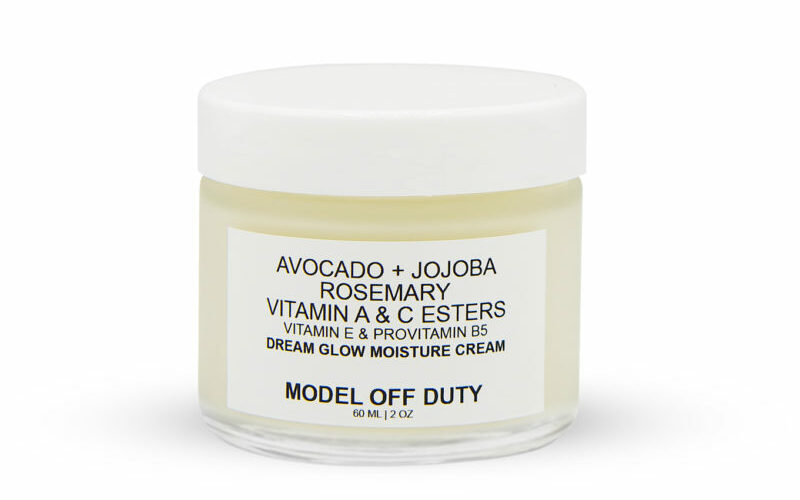
Model Off Duty Beauty Dream Glow Moisture Cream ($48) size: 2 oz
The Dream Glow Moisture Cream is an opulent and revitalizing moisturizer infused with anti-aging ingredients that effectively soften and safeguard your skin. Its primary focus is on diminishing fine lines, hyperpigmentation, dark spots, and uneven skin tone, resulting in a visibly smoother, brighter, and more radiant complexion. Additionally, this cream imparts a refreshing sensation, enhancing your skin’s natural glow.
2. TATCHA
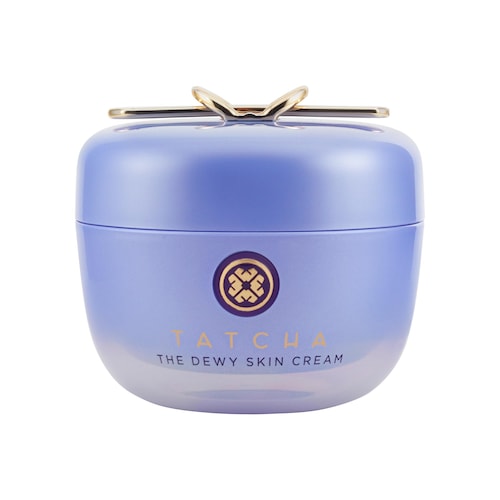
Tatcha The Dewy Skin Cream Plumping & Hydrating Refillable Moisturizer ($72) size: 1.7 oz
This moisturizer quickly drenches skin with hydration and smooths the look of fine lines to give a plump, radiant glow. It improves the skin’s ability to seal moisture for hydrated skin all day. Hyaluronic acid is boosted by Hadasei-3, a ferment of Japanese superfoods that visibly plumps skin and protects against oxidative stress.
3. SKINCEUTICALS
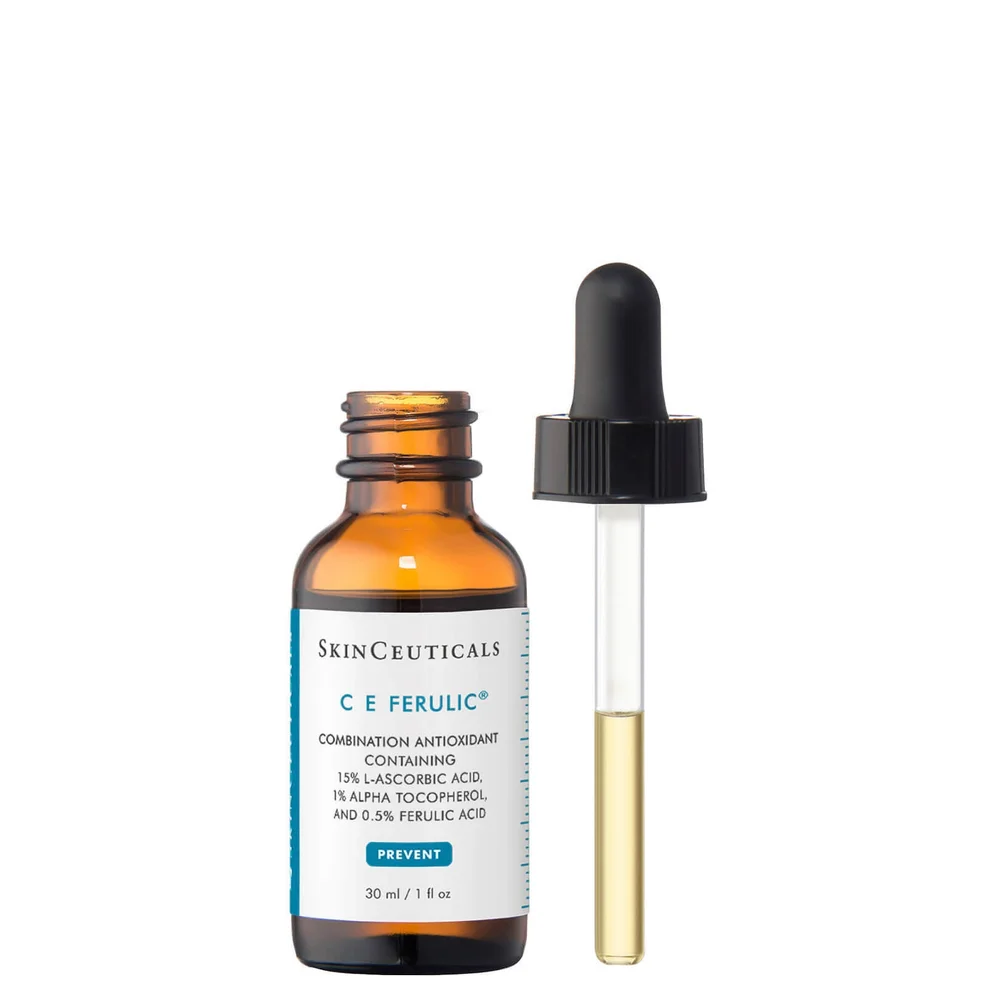
SkinCeuticals C E Ferulic ($185) size: 1 oz
Features a synergistic antioxidant combination of ferulic acid and pure vitamin C and E to enhance your skin’s protection against environmental damage caused by free radicals. In addition to antioxidant protective benefits, this formula improves signs of aging and photodamage to reduce the appearance of lines and wrinkles while firming and brightening your complexion.
4. LA MER
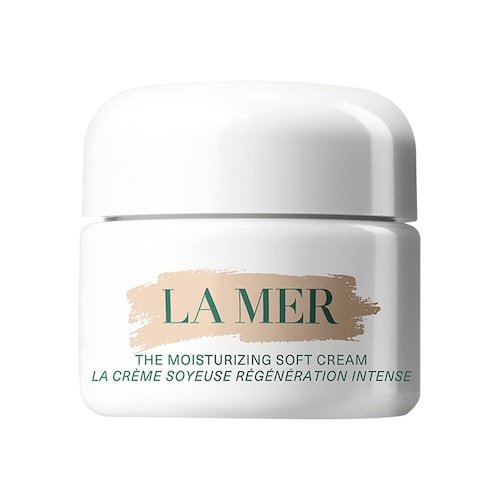
La Mer The Moisturizing Soft Cream Moisturizer ($200) size: 1 oz
The Moisturizing Soft Cream helps skin reverse and resist visible signs of aging. This silky-soft face cream plumps the look of skin from within and helps it look lifted, firmer, healthier, and revitalized. Hydration softens the feel of skin and soothes sensitivities while visibly diminishing lines and wrinkles.
5. MODEL OFF DUTY BEAUTY
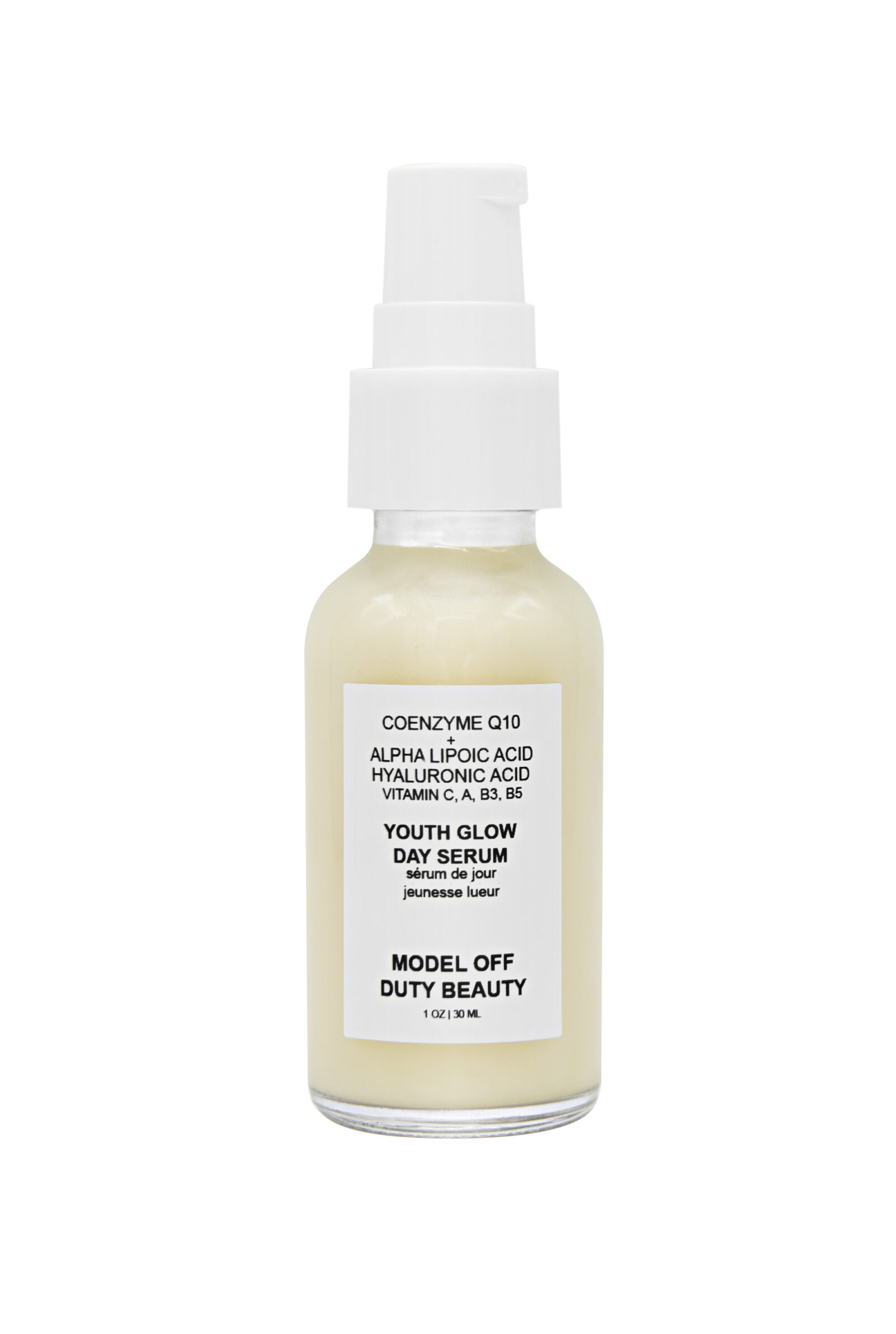
Model Off Duty Beauty Youth Glow Day Serum ($44) size: 1 oz
Youth Glow Day Serum is an anti-aging powerhouse. It effectively enhances the texture of your skin, making it smoother, firmer, clearer, and visibly younger-looking. Hyaluronic acid holds water and helps keep it hydrated and plump.
6. CLARINS
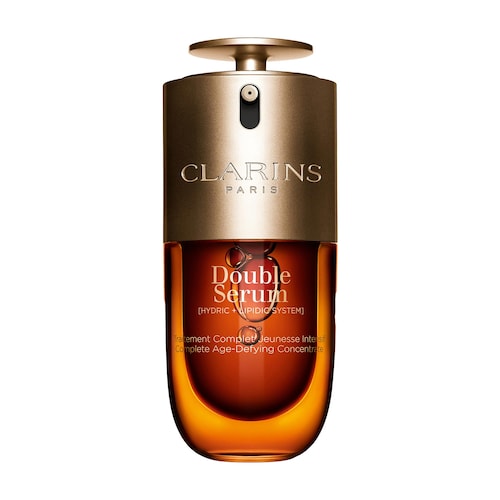
Clarins Double Serum Anti-Aging to Firm, Boost Radiance and Refine Pores ($95) size: 1 oz
Inspired by skin’s water and oil makeup, this dual formula is revolutionized to target two types of aging, chronological and environmental and lifestyle aggressors, with Epi-Aging Defense Technology. It acts quickly to strengthen the skin’s moisture barrier for smoother, younger-looking skin.
